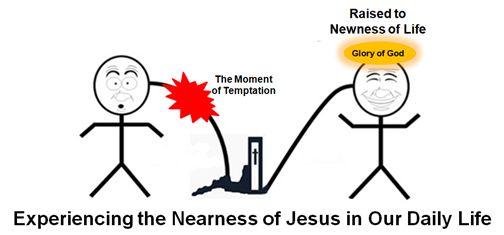Resurrection life can be experience in this life because the nearness of Jesus can be experienced.

Salvation, in the purest sense of what it means to be saved, is less to do with “who forgives all of your sins” or “who heals all of your illnesses,” than it does with “who redeems your life out of destruction.” Have we really missed the true picture of what it means to be saved and in doing so missed the marvelous wonders of being a believer in Jesus Christ? Paul simply said, we are
Always bearing about in the body the dying of the Lord Jesus, that the life also of Jesus might be made manifest in our body. For we which live are alway delivered unto death for Jesus’ sake, that the life also of Jesus might be made manifest in our mortal flesh (2 Cor. 4:10-11).
We have this treasure of life in an earthen vessel that the excellency of the power of the marvelous, wonderful experience of life is of God and not of us. Salvation is actually about “We are troubled on every side, yet not distressed; we are perplexed, but not in despair; Persecuted, but not forsaken; cast down, but not destroyed” (2 Cor. 4:7-9). It is as the Psalmist said, “Bless the Lord, O my soul: and all that is within me, bless his holy name. Bless the Lord, O my soul, and forget not all his benefits . . . Who redeemeth thy life from destruction” (Ps. 103:1-6).

In Chapter 3 of the “Resurrection of Life, Jesus and the People of the Way,” the actual process by which all things created continually experiences the essence of life is examined. How does that which does not have life within itself experience the life that lives? The writings of James, Chapter 1, reveals the basic understanding of how man experiences the way.
Resurrection life is the culmination of the way of life for all living creatures.
When a tomato seed is planted into the ground, the outer husk of that tomato seed has to decay, to rot, to set free the essence of life within the seed. The darkest moment for the tomato seed, as it is laying in the ground, is that last moment the outward husk is decaying to enable the little spout of life that is within the seed to break forth finally into the ground.
The darkest hour can also be illustrated by a preborn baby chick. The embryo within the egg has finally developed enough to begin to peck its way out of the shell. The darkness moment of its existence, although it cannot actually comprehending it, is just before it begins to break forth through the shell. Likewise, the darkness moment of any seed is just before that final moment when new life breaks forth out of the husk of the seed.
I wonder if you could put our mind into a baby chick, or you could put our mind into a seed that you just might hear these words, “My God, My God, why has thou forsaken me.” It is that moment, the darkest hour of the night, when it seems why everything is lost. It would be the last moment the physical husk, the last moment the physical circumstances, would lose its control. It would be just before that burst of light of the resurrection life begins to break forth.
I think that is exactly what the statement of Jesus on the cross is illustrating. How I used to preach it in years gone by is that cry, “My God, My God, why has thou forsaken me,” is coming forth out of Jesus because he is bearing the sins of the world. I erroneously thought that since God cannot look upon sin he had to turn his head away from Jesus. Thus, when God turned his head away from his Son, Jesus cried, “Why has thou forsaken me, why has thou abandoned me?” I now believe that the true essence of the statement is that Jesus is feeling the reality, the pressure, of the darkest hour of the moment before new resurrection life can come forth out of the old.
I am certain that probably all of us have experienced in our life that moment in some various degree. We feel like that there is simply no way to continue. We have the sense that all hope is lost.
The seed has to go through that moment experiencing the reality of the process that eventually will send a little spout up through the ground to the warmth of the sun. It not only has to break out of its husk, but it also has to push up through the earth before it can break forth manifesting new resurrection life. Then, as it comes forth into new life, it will often experience a pounding rain, perhaps a hail storm, and sometimes even a hotter than normal sun scorching it. Yet, it keeps growing to experience the reality of the resurrection life.
The tomato seed will eventually manifest the fullness of life which it had within itself when it was planted into the ground. The life within the seed will spout up through the ground, endure the elements of weather, and bring forth a new tomato plant bearing new tomatoes. The seed planted within the ground will produced new tomatoes with new seeds within it, fulfilling the way of life for the tomato.
Resurrection life is experiencing the eternal life of the creator.
Could this actually be the meaning of the word eternal in the New Testament? Someone sent me an e-mail not too long ago. He stated that he would like to hear my thoughts on John 17:3, “And this is life eternal, that they might know thee the only true God, and Jesus Christ, whom thou hast sent.” As I begin to write back to him, the thought came to me that the first paradigm in our mind that has to be broken to comprehend the meaning of this verse is our understanding of the word eternal in “this is life eternal.”
Often, as we encounter the word eternal in the Scriptures, we lock-on to the thinking that we are going to live forever. We actually shift the emphasis to our existence. In our analogy, it would be putting the emphasis upon the tomatoes or even the seeds rather than the life within the seed. This is not to say that man will not live eternally, but I think the emphasis of the New Testament writers was not on the “tomatoes or the seeds” but upon the life that is within the tomatoes and the seeds.
The original word translated eternal means “perpetual.” Is not the life that is in the seed being planted and then reproducing itself in the life of the new seed in the new tomato on the new tomato plant, perpetual? Is not the emphasis put on the perpetuity of the essence of life within the seed rather than the decaying outward husk of the seed? The perpetuation of life within the seed and the continual death and dying of the husk of the seed is the mystery of the way.
Everything in the physical world is going to decay. Every relationship experienced in the earthly realm is going to go through its cycles of highs and lows. Everything that has anything to do with a physical reality is going to decompose. It is going to go down, but even though it goes down there is something that is perpetual in that process.
I think it is to that which is perpetual that the New Testament writers were referring when they used the word eternal. They knew, based upon their writings, that the living physical world will always go down. They also knew that there is something eternal in all living beings. They knew that the eternalness of the living created world was the Spirit of the eternal One within all living creatures.
Resurrection life is the reality of all living creatures in the world.
Experiencing resurrection life is really very simple, although it is sometimes difficult to comprehend. The real question is, as we experience life, where is the emphasis of our focus? Do we focus upon the physical realm that is continually dying? Or, do we focus upon the essence of the Spirit within that is eternal and never dies?
If our focus is upon the eternal, the dying of the physical realm, then, would not emotionally take us down with it. We would make it though the death and dying of the physical world without its destructive affect upon us. When our focus is upon the eternal, upon the living Jesus, we will be enabled to experience the exuberant, abundant life that Jesus promised.
We would be encountering a quality of life that is eternal. It never dies. Again, is our focus upon that which dies, the physical? Or, is our focus upon that which does not die, the spiritual, the eternal, the living God? As simply as it can be stated, wherever the focus is that is where we experience life. Focus upon the living Jesus and you will experience resurrection life.
The writing of James recorded that truth: “Blessed is the man that endureth temptation: for when he is tried, he shall receive the crown of life, which the Lord hath promised to them that love him” (James 1:12). First, what does the crown of life mean? I can remember a way back when that I actually thought that the crown of life was that crown which we received in the next life. We would sing such songs as “will there be any stars in your crown.” Now, I know we were totally missing what the “crown of life” really means.
The crown of life is not just experiencing life but experiencing the abundant life of Jesus’ statement, “I am come that they might have life, and that they might have it more abundantly.” The crown of life is the ultimate life that can be experienced. It is experiencing resurrection life: “Blessed is the man that endureth temptation: for when he is tried, he shall receive the crown of life, which the Lord hath promised to them that love him.”
Secondly, if we correctly ascertain that the crown of life means the ultimate life that can be experienced, then that crown of life living cannot be experienced without the temptation. We all want to experience abundant life, the rich, full, completed life, but based upon the statement of James, you will never experience the crown of life unless you go through the temptation.
Resurrection life will always go through the temptation of life.
The life we want to experienced is illustrated by the man who has the smile upon his face. It is the man who has been moved to experience crown of life living. How does the man, who is just experiencing life, be moved to the man who is experiencing the crown of life, resurrection life?

James said, “Blessed is the man that endureth temptation: for when he is tried, he shall receive the crown of life. . . .” We need to come to understand what that temptation (original meaning, “a putting to proof” from the root, “to test”) really means. What is the trial or trials that can change our lives? We are often confused in understanding temptation because there is mystery in temptation.
We will examine in this chapter not only the mystery of temptation, but the nature of temptation, the power of temptation, and the conquering of temptation as well. We need to understand all we can know about temptation because it is the path to resurrection life: “Blessed is the man that endureth temptation: for when he is tried, he shall receive the crown of life, which the Lord hath promised to them that love him.”
What we have been trying to emphasize in the last two chapters is something that is really very beautiful. It is almost too simple and too glamorous for us to comprehend and to believe. We all want to experience the abundant life, do we not? We all want to experience crown of life living, do we not? We all want to experience the power of resurrection life, do we not?
In fact, most of the things we have done in life have been tried in order that we might experience abundant life. It makes no difference whether we are in the church, out of the church, whether it is spiritual or physical, we want to experience the best possible life that we can experience. Again, most of the things that we have been doing has been done for that reason.
Amazingly, all of those things we are doing, whether in the church or out of the church, whether our attempt is spiritual or physical, all those things we are attempting to do actually work against us. They actually prohibit us from experiencing the supremely abundant life, resurrection life, we desire. In other words, what does the morning actually do to create the morning? What does the apple do to create the apple?
The apple will go through a lot of things but what does it actually do to become the apple? As it falls into the ground, does it say, of course, it does not have the capability to say, but does the apple seed say to itself “If I can just fine someone to agree with me, then we are going to produce a great apple.” “If I can just identify that I am an apple seed, I will produce an apple.” An apple produces an apple not because it indentifies itself as an apple seed. It produces an apple because it is an apple seed experiencing the grace of God in its existence.
Resurrection life is often difficult to comprehend because there is mystery involved.
We do seem to keep struggling with how to experience crown of life living. I do think we need to know who we are. I think we do need to know we are believers. I do think we need to know we are Christians, but we only think that we need to know that because something negative has and is happening. If the negative thing that is happening can be eradicated, then there is no need to try to know who we are. We will be actually experiencing who we are. We will not be experiencing who we are because we are trying to convince our self we are somebody, but we will experience who we are because simply that is who we are by the grace of God.
There is great mystery in experiencing the temptation that could enable us to experience crown of life living. What did the writer of Hebrews say about Jesus? He recorded, “For we have not an high priest which cannot be touched with the feeling of our infirmities; but was in all points tempted like as we are, yet without sin” (Heb. 4:15). Peter also stated that Jesus knew no sin, neither was guile found in his mouth, deception found in his mouth (1 Pet. 2:22).
The statements of the writer of Hebrews and of Peter are probably not to mysterious. Then, Jesus said, “But I say unto you, That whosoever looketh on a woman to lust after her hath committed adultery with her already in his heart” (Matt. 5:28). The implication is that sin has already been committed whether the act is performed or not. According to Jesus, if a man faces any temptation of adultery, fornication, lasciviousness, lying, cheating or steeling, it does not make any difference whether he would eventually lie, cheat, or steal, he has committed a sin already in his heart, in his mind. Mysteriously, Jesus is saying just to face any of these temptations is to commit sin.
How could Peter say that there was no sin, so deception found in Jesus and the writer of Hebrews say Jesus was tempted in like manner as you and I and knew no sin. There has to be an understanding of temptation that goes deeper than most of the common understanding of temptation today. The argument has been set forth that Jesus was tempted with adultery as emphasized in the movie, “The Temptation of Christ.” Accordingly, since Jesus was tempted in like manner as all of us, he had to be tempted with adultery, fornication, lasciviousness, lying, cheating, or steeling.
The explanation was set forth in debating the issue that Jesus may have faced the same temptations as us but he had the power not to yield to any temptation. But, according to his own words, if he was tempted of any of these temptations, he had already sinned because he had sinned in his heart, in his mind. Yet, Peter said that no sin was found in him, neither was deception. There must be a temptation that cannot be compared with the temptation to commit
Adultery, fornication, uncleanness, lasciviousness, Idolatry, witchcraft, hatred, variance, emulations, wrath, strife, seditions, heresies, Envyings, murders, drunkenness, revellings, and such like . . . (Gal. 5:19-21).
There is a temptation that all men, including Jesus, will face in life that has nothing to do with any of the sins listed above or “such like.” It is a fact of every man’s life that at one time or another he will go through the process of the way of life. For example, the most simple and easily understood way of life is man is taken down at night to be raised in the morning.
Resurrection life is posible for all men simply because all men will face the temptation.
It does not make any difference who you are or what you are. It matters not how much money you have or how educated you become. It absolutely does not make any difference, you are going down at some point in your life. The physical side of your life has been degreed to go down by a created act of God. The writer of Hebrews simply stated, “. . . it is appointed unto men once to die but after this the judgment” (Heb. 9:27). The original word that is translated die means, “to die-off,” as opposed to experience “literal death,” or to be “dead, as a corpse” (The three ways the words for “to die,” “death,” and “dead” are used in the New Testament). Jesus, by the power of the Holy Spirit, would experience the continual dying-off of trying to control his own life. The heavenly Father would then take him to his literal death on the cross. He would become a corpse and be raised to newness of life in the resurrection (Rom. 6:1-6).
We struggle to understand the mystery of temptation because we struggle to grasp what it means to be a true Christian, a true human being. In that struggle to understand, we often ponder why would God want to kill us (or cause us to die) when he created us to live. God did create me to experience the marvelous privilege and opportunity to experience his life.
God created me to experience the completed true me. He is not in the business of annihilating the true me. He created me to experience life. Simply stated, he created me to experience his resurrection life.
Resurrection life is always experienced in the physical body of which we dwell.
For me to experience his life, I first have to be given, since I am not a God or a spirit, a vessel of clay through which I can experience him. Moreover, since “we have this treasure in earthen vessels, . . . the excellency of the power of life is of God, and not of us” (2 Cor. 4:7, summarized). I can experience the life that is of God, but I first have to have an earthen vessel in which I can experience that life.
Paul is implying, if I am understanding him correctly, that we are like the apple seed in that we do not have life in the husk of our outward physicality but we have his life within our vessel. The only way that his life can continually come forth is that the outward husk has to decay, die-off. Paul simply stated, “though our outward man perish, yet the inward man is renewed day by day” (2 Cor. 4:16).
God has so arranged that everything that is physical does not have life in the power of its physicality. Yet, every living creature has been given the opportunity to experience his life in its not-living matter. In some way, my experiencing his resurrection life has to occur within and yet not of the physical reality of who I am: “And the Lord God formed man of the dust of the ground, and breathed into his nostrils the breath of life; and man became a living soul” (Gen. 2:7).
The life of God invigorating the cells of my physical brain produces, mysteriously, my soul. It is in my soul that God will bring me by his “grace, who hath called [me] unto his eternal glory by Christ Jesus, after that [I] have suffered a while, [to] make [me] perfect, stablish, strengthen, settle[d]” (1 Pet. 5:10). Even though I will be taken down by the hardship and/or pain (afflictions) of having this treasure in an earthen vessel, I will be raised to newness of life, experiencing the glory of his presence in my soul. It is how I continually experience the nearness of Jesus, resurrection life, in my life.






